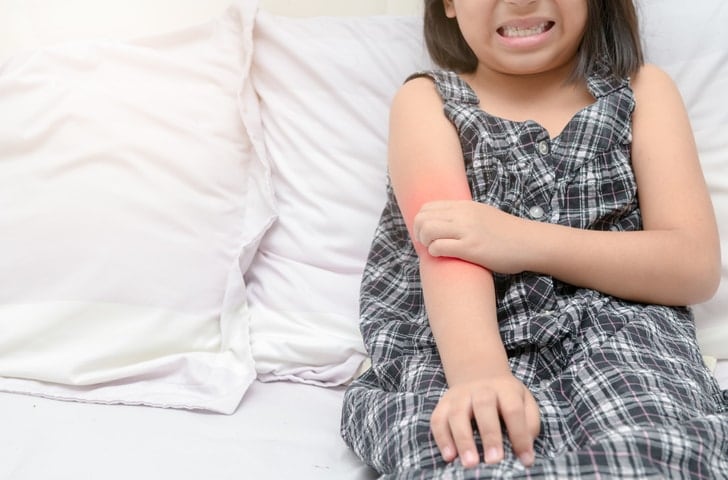
Approximately 1 in 10 people develop psoriasis as children, typically before the age of 10. Psoriasis is a medical condition caused by an immune system disorder that causes skin cells to grow too fast, which causes itchy skin areas, red patches, and thick flaky sores.
What Is Psoriasis?
For most people, psoriasis, is a long-term condition. This non-contagious, autoimmune disorder targets the skin, scalp, and nails. Children usually get psoriasis on the face, buttocks, and scalp.
Most children’s psoriasis is limited to a few patches that usually respond well to treatment. More serious cases may need more aggressive treatment. There are many different treatment options, so if one doesn’t work, it’s likely another one will.
What Are the Symptoms of Psoriasis?
Psoriasis appears as raised red patches that are covered by silver scales. The affected areas may flake when touched. The most common type of psoriasis in children is called raindrop psoriasis (guttate). Raindrop psoriasis is characterized by small, red, scaly dots that form over wide areas of skin.
What to Look Out for If You’re Concerned Your Child Might Have Psoriasis
Look for the following symptoms if you believe your child may have psoriasis:
- raised red patches of skin
- silvery scales on red patches of skin
- dry, cracked skin that may bleed from time to time
- itching, soreness, or a burning sensation
- thick, bumpy fingernails
How Psoriasis Is Treated?
Although there is no cure for psoriasis, there are many different treatment options that can control and make it go into remission. Your doctor will advise which treatments are best based on the severity level (mild, moderate, or severe) and other factors.
- Topical Creams: Creams smoothed on affected areas can help alleviate mild to moderate psoriasis symptoms.
- Corticosteroids (Cortisone): Cortisone is the most widely used topical medication for treating mild to moderate psoriasis.
- Anthralin: Anthralin is a prescription medication that can help treat thick psoriasis patches.
- Calcipotriene and Calcipotriol (Vitamin D): Both preparations are synthetic derivatives of Vitamin D and are applied topically. They work by inhibiting the growth of skin cells.
- Retinoids (Vitamin A): Retinoids are synthetic vitamin A derivatives that help certain types of psoriasis.
- Coal tar: Coal tar has been a safe and effective way to treat psoriasis for more than a century. Coal tar is a by-product of coal processing. Coal tar preparations slow down skin cell growth and turnover, resulting in the thinning of the psoriatic plaques.
Ways to Help Your Child When Diagnosed with Psoriasis
You can help your child by:
- Serving healthy foods: Lots of fruits and vegetables can help your child have fewer or less severe psoriasis symptoms.
- Helping your child stay at a healthy weight: If your child is overweight, it increases the risk of inverse psoriasis development.
- Reminding your child to clean and moisturize skin: Regular bathing and then applying moisturizer can help ease the psoriasis symptoms. Coal tar soap may be a good option.
- Spending time outdoors: Limited sunlight can help with psoriasis, but it’s very important not to sunburn or tan.
- Giving your child support and understanding: If your child has emotional difficulties related to psoriasis, talking with a therapist or joining a support group can help your child better understand and handle the challenges of dealing with psoriasis.
Our board-certified dermatologists can help you and your child learn if psoriasis is an issue. We offer many different treatment options to help keep your child comfortable and safe. Contact us today for a consultation by calling us at (305) 532-4478 or by filling out the form right on this page.

